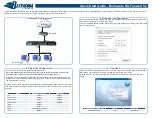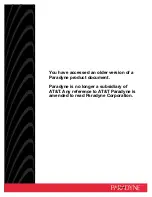
ITG User’s Guide
Chapter 1 Overview
This chapter gives an overview of the 2 ports & 4 ports desktop version Internet Telephony
Gateway (ITG) and a detailed description of its front panel and rear panel.
1.1 Features
The ITG is a cost-effective and highly reliable analog Voice over IP (VoIP) Gateway that
offers toll quality voice and real-time fax data over IP networks. With
its embedded architecture, the gateway is ideal for VoIP applications associated with
Remote Office and Branch Office (ROBO) environments. With its built-in user-friendly
interface, the gateway may be installed easily and conveniently to yield immediate cost
savings. One Internet Telephony Gateway supports up to eight voice or Fax communications
simultaneously.
Implemented with an efficient Real-Time Operating System (RTOS) and flash memory, the
ITG provides upgradeable capabilities, so it may be programmed with updated firmware
locally or via the network at any time. It comes equipped with
remote management capabilities, configurable signaling to work with PBX, KTS, and/or
telephone. The ITG
utilizes advanced VoIP related technology. It
includes
various voice coders and fax algorithms, echo cancellation, Voice Activity Detection
(VAD) , Comfort Noise Generation
(CNG) , and lost packet recovery algorithms.
1.2 Networking Protocols
The ITG supports several industry-standard networking protocols required
for voice communication. The following table describes these protocols.
Networking Protocol
Description
Internet Protocol (IP) IP is a messaging protocol that addresses and sends packets across
the network. To enable IP protocol, the ITG must have a Real IP
address, subnet, and gateway assigned to it.
Voice over IP Protocol VoIP enables the ITG to transfer voice communications over an IP
(VoIP)
Trivial File Transfer
Protocol (TFTP)
Real-Time Transport
(RTP)
network. The ITG employs ITU-T H.323 protocol for setting up call
with one another.
TFTP allows you to transfer files over the network. The ITG
implements a TFTP client allowing you to download new revision
firmware from a TFTP server. The TFTP client requires a TFTP
server in your network.
RTP is a standard for transporting real-time data over IP network.
The ITG uses RTP protocol to send digitized and compressed voice
packets.
1.3 Package Contents
Overview
9










































